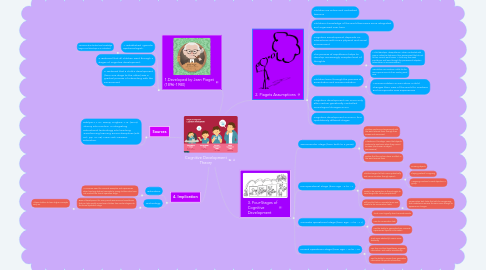
1. Sources
1.1. Roblyer, M. D., & Hughes, J. E. (2019). Theory into Practice. In Integrating educational technology into teaching: Transforming learning across disciplines (8th ed., pp. 47-48). New York: Pearson Education.
2. 1.Developed by Jean Piaget (1896-1980)
2.1. 1. Established "genetic epistemologist".
2.1.1. someone who studies how knowledge begins and develops in an individual
2.2. 2. Believed that all children went through 4 stages of cognitive development.
2.3. 3. Believed that a child's development (from one stage to the other) was a gradual process of interacting with the environment
3. 4. Implication
3.1. Education
3.1.1. An increase need for concrete examples and experiences when teaching abstract concepts to young children who have not reached the formal operation stage.
3.2. Technology
3.2.1. Basis of development for many visual resources and simulations that can help quickly move/raise children from earlier stages into the formal operation stage
3.2.1.1. Allows children to learn higher concepts early on.
4. 3. Four-Stages of Cognitive Development
4.1. Sensorimotor Stage (from birth to 2 years)
4.1.1. Children explore and experiment with the world around them through their senses and movement
4.1.2. Milestone in this stage: Learn that objects continue to exist even when they cannot be seen (also known as object permanence)
4.1.3. Realize that their actions have an effect in the world around them
4.2. Pre-operational Stage (from age ~2 to ~7
4.2.1. Children begins to think more symbolically and communication through speech
4.2.1.1. Drawing objects
4.2.1.2. Playing pretend/ imagining
4.2.1.3. Assigning numbers to each objects in a group
4.2.2. Tends to be egocentric as they struggle to view things from others perspectives
4.2.3. Still tend to think in concrete terms and unable to do conservation tasks
4.2.3.1. Conservation task: tasks that calls for recognizing that a substance remains the same even though its appearance changes
4.3. Concrete operational Stage (from age ~7 to ~11)
4.3.1. Think more logically about concrete events
4.3.2. Can do conservation task
4.3.3. Has the ability to generalize from concrete experiences/ specific information
4.4. Formal operations Stage (from age ~12 to ~15
4.4.1. Think more abstractly/ reason more abstractly
4.4.2. Can form and test hypotheses, organize information, and reason scientifically
4.4.3. Has the ability to reason from generalize information to specific information
5. 2. Piagets Assumptions
5.1. Children are active and motivated learners
5.2. Children's knowledge of the world becomes more integrated and organized over time
5.3. Cognitive Development depends on interactions with one's physical and social environment
5.4. The process of equilibrium helps to develop increasingly complex level of thoughts
5.4.1. A child develops "disequilibrium" when confronted with new or unfamiliar features in their environment that do not fit their current world views. A child may then seek equilibrium and learn through the processes of adaption (assimilation or accommodation).
5.5. Children learn through the process of assimilation and accommodation
5.5.1. Assimilation occurs when a child fits the new experiences into their existing word view
5.5.2. Accommodation occurs when a child changes their view of the world to combine and incorporate new experiences

